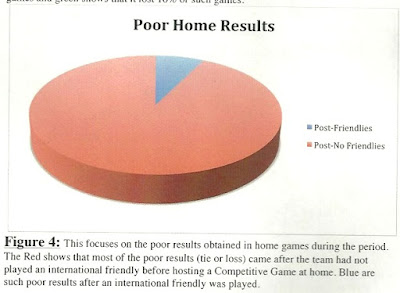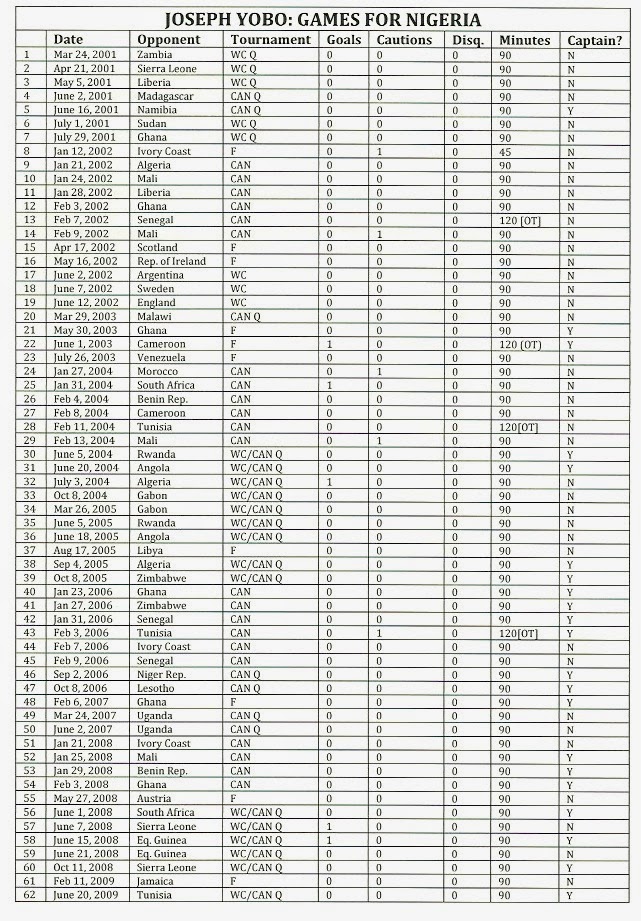Effects of International Friendlies on Nigeria's Competitive Outcomes…..
Recent reports indicate that Nigeria plans to play
two international friendlies before a key Nations Cup qualifier against Egypt
next March. Quite often Nigeria, as well as other nations, seek to play
international friendlies before a competitive game. The idea is that an
international friendly prepares the team for the more important competitive
game that follows. However, Nigeria does not always play international
friendlies just before participating in a competitive game. This makes one
wonder whether or not it makes a difference playing international friendlies
before a competitive game.
This article explores the question of whether
international friendlies before a competitive game makes a difference in the
outcome of the competitive game.
Method
While we will not depend on an ultra scientific
test to measure effects of international friendlies on the results of
competitive games for Nigeria's Super Eagles, we will in this piece look at a
few data.
We will investigate Nigeria’s games in the last decade (i.e. 2005-2015)
and assume that a good outcome in a competitive game played away from home is
either a draw (or a win). We assume also that Nigeria always has a high
probability of winning its home games. Therefore, our measurement interest is
in poor results achieved at home and how those relate to a prior international
friendly or no prior international friendly.
Furthermore, for this exploratory study we do not use any competitive
game played at a neutral venue i.e tournament games. The reasoning behind this
is that such games often include a significant time that the team practices
together which may on its own negate the effect of a lack of an international
friendly. Further, we assume that an effect of the international friendly is
played when such a friendly occurs within a week before the competitive game.
The effect of a friendly may be over multiple competitive games if such
competitive games are within two weeks of each other. Finally, the effect will
be calculated on efficiency basis i.e. percentage of total potential points
earned by the team.
Results
Away Games: Figures 1-3 show results of Nigeria’s away games since 2005.
The first figure compares efficiency between Away Games after a Friendly to
Away Games after no Friendly. The efficiency for away games after a friendly is
higher than efficiency after no friendly. In the data, we have 12 games each that
was played after a friendly and after no friendly. In the first case (see
Figure 2), there was one defeat (1-2 to Uganda in 2007) after a friendly in
Nairobi against Kenya. Nigeria won 6 and
drew 5 of the other away games played after an international friendly.
Figure 3 shows away games played by Nigeria without the benefit of an
international friendly. Nigeria still did well with 4 wins, 6 ties, and losing
only in Conakry to Guinea (0-1) and in Sudan (0-1).
Home Games: Figure 4 looks at poor results obtained at home in competitive games since 2005. These results are 2-2 v Guinea, 1-1 v Kenya, 2-3 v Congo Republic, and 2-2 v South Africa. Only one of those results followed an international friendly and that was the 2-2 draw against South Africa. Note also that this friendly occurred with the CHAN team i.e. home-based players. The rest occurred after no international friendly was played to prepare the team.
Analysis
While there may be a tendency to look at data and assume that they are
conclusive, we caution that for this particular study we must recognize results
as exploratory. For instance, the poor results shown in Figure 4 for good
reasons occurred during an era when the NFF was battling with the coach and the
government and, thus, results can also be alternatively explained.
However, the results offer some lessons. Those lessons include that international
friendlies are important before competitive games, particularly when it is
clear that the team has just a few days to prepare for competitive games and
the coach needs actual games to be sure which problems need urgent correction
before a competitive game. Without international friendlies, the coach relies solely
on information obtained in slower-paced training. Further, international friendlies
assist the coach in making personnel and tactical decisions. Moreover,
friendlies help build team confidence and lead to psychological readiness.





Comments
Post a Comment